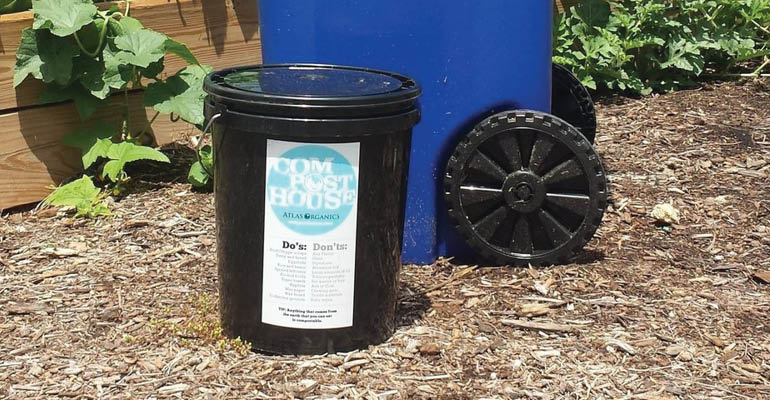Curbside pickup launched late August following a community outreach campaign and after buckets and carts were dropped off to residents.

What began as a plan of a few local business people and one small nonprofit to offer commercial composting in Chattanooga, Tenn., has taken some turns. The effort has evolved into a residential program and food waste recycling company Atlas Organics has stepped in to help these community players take the next steps. The Chattanooga operation launched late August under the company’s program, “Compost House.”
Now the partners are thinking about how to scale up, hoping to eventually get municipality buy-in as well as run a much larger commercial composting site.
The immediate goal is to sign up 100 households by the end of the third quarter of 2017. And to have 500 households by the end of the next year.
Chattanooga commercial real estate businessman Cullon Hooks and local nonprofit green|spaces, which focuses on sustainability initiatives, were working to prove out a compost concept at a local farm using a few businesses’ food scraps. They realized it would be tough to scale up themselves, especially to start with a commercial project, says Hooks.
So Hooks connected with Atlas, which brought in a system to install an aerated pile, a smaller version of a model the organics recycler runs in Greenville, S.C.
“Atlas and I decided that with their Compost House success in Greenville we should start a small residential program in Chattanooga and eventually ramp up to bring the commercial side to town,” says Hooks, who has come on board as Atlas’s Chattanooga Compost House coordinator. Already Atlas has proposals out to local commercial clients who want to compost.
Atlas actually started operating on the commercial side, where most of its business still lies. In June 2017 alone it diverted over one million pounds of commercial food waste in Columbia, Greenville, and Spartanburg, S.C. as well as Western North Carolina.
“We decided to start with residential rather than commercial in Chattanooga to get more market share and grow community awareness,” Atlas Organics CEO Joseph McMillin says. “Collections and processing capabilities are smaller with residential, meaning less expenditure to enter the market. Scraps remain relatively clean too.”
The partners hope to scale up to a 12,000-ton per year facility within 12 to 18 months and by that point add commercial feeds.
Curbside pickup launched late August following a community outreach campaign and after buckets and carts were dropped off to residents. As part of the paid service, they can get up to 10 gallons of finished compost a month. What they don’t take is donated to community gardens.
In addition to weekly curbside collections there are two drop-off locations, with buckets provided for this service too, for a lower fee.
The push to get the word out began with a public relations campaign in July, leveraging local papers, a local television station and social media. They are marketing through a local community supported agriculture operation. And a farmers’ market has allowed for flyers to be placed in residents’ boxes of food.
The partners launching this program are finding the community has been receptive, as may have been expected. Chattanooga has grown in recent decades. The city’s population sits at roughly 180,000 today, up from 150,000 in 1990. The metropolitan area has also experienced growth. Hooks says the population also now skews younger, with a growing interest in environmental issues. That’s a change from a past when the town was once heavily polluted, largely from coal-fired plants. In recent years a big push to clean up the environment through public-private partnerships has transformed the city.
“We are trying to educate and further motivate residents, hoping they will see the bigger picture that food waste has value rather than simply see it as garbage to get carried off to landfill,” says Hooks.
The partners are already thinking about where they may site a larger facility to accommodate businesses too. And they are looking into public private-partnerships to support the model, according to Hooks.
This new direction, beginning with a residential foundation will be a faster ramp up process, as will partnering with Atlas, anticipates Michael Walton, green|spaces executive director.
“We were trying to figure out how to build it from scratch before Atlas came,” Walton says. “But now we won’t be reinventing the wheel. They have the buckets, the blowers for piles, and other equipment. And they have the branding and marketing campaign. We were happy to partner with them and let them run it.”
“We eventually want to see the ability for businesses we work with and events in Chattanooga to be zero waste. We think this partnership will allow us to get there in time,” he says.
About the Author(s)
You May Also Like




